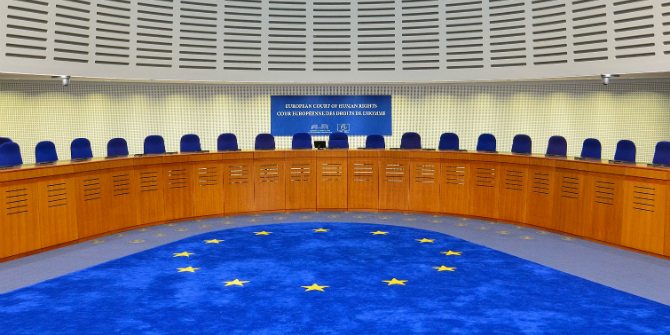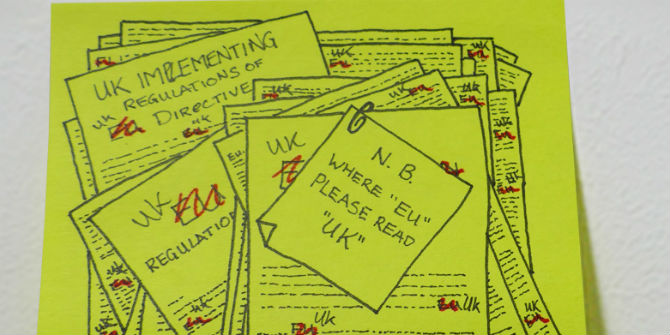 Anne Twomey argued on LSE Brexit that the Supreme Court should focus on the fact that Boris Johnson has lost the confidence of the Commons. Given that he has not yet lost a vote of no confidence, Tarunabh Khaitan (University of Oxford) says this is a problematic approach. Instead, the Court should ask whether prorogation is likely to have the effect of frustrating Parliament in a matter where inaction will lead to a fait accompli.
Anne Twomey argued on LSE Brexit that the Supreme Court should focus on the fact that Boris Johnson has lost the confidence of the Commons. Given that he has not yet lost a vote of no confidence, Tarunabh Khaitan (University of Oxford) says this is a problematic approach. Instead, the Court should ask whether prorogation is likely to have the effect of frustrating Parliament in a matter where inaction will lead to a fait accompli.
The difficulty with ‘purpose’
The key issue on which the Miller 2/Cherry litigation will turn is the Court’s ability to craft a principled distinction between legal and illegal prorogation. As an act of constitutional shamelessness that traverses the boundary of legality without obviously breaching it, the prorogation is calculated to be legally difficult to adjudicate upon. The Court of Sessions in Scotland decided that the distinction lay in whether the purpose of prorogation was proper, and after reviewing the facts determined that:
the only inference that can properly be drawn on an objective basis is that the government, and the Prime Minister in particular, wished to restrict debate in Parliament for as long as possible during the period leading up to the European Council meeting on 17-18 October and the scheduled date of Britain’s departure from the European Union. [123]
Purposes are inextricably linked to motives, and judges are typically reluctant to attribute bad motive even to private actors, let alone an elected government. Ask any discrimination lawyer! The Court of Sessions has no doubt been bold in its factual finding, and that too from circumstantial evidence. The Supreme Court is unlikely to follow its lead on this count, and wisely so. Short of finding a smoking gun, judges will be institutionally vulnerable when they accuse elected governments of bad faith (even if, doctrinally, the finding is sound).

In her post on the Miller 2 case, Anne Twomey correctly points out that the legality of the use of prorogation cannot be determined by whether it is designed to seek political advantage. She counsels the Supreme Court to
be cautious about assessing ‘improper purpose’ by reference to political advantage. Instead, an alternative would be to limit improper purposes to only those purposes that involve a breach of constitutional principle, such as the exercise of prorogation when the government has lost the confidence of the House, or is seeking to avoid a vote of no confidence against it.
Twomey is right to avoid a distinction based on political advantage. But her proposed alternative does not help a Court seeking to avoid the political thicket very much. To decide whether the purpose was to gain some political advantage would require the Court to ascertain the relevant motives of the Prime Minister. However, asking it to determine whether a government ‘has lost the confidence of the House, or is seeking to avoid a vote of no confidence’ similarly invites the Court, in the absence of a clear confidence vote in the House of Commons, to decide whether the Commons continues to have confidence in this government. While it is true that this government has lost many votes in the House, it is also true that the House has refused to dissolve itself and has also failed to/decided not to vote the government out (yet). Asking a Court to second-guess Parliament’s (lack of) confidence in a government is as politically charged a question as what the Prime Minister’s motives might be. The Supreme Court would be wise not to accept Twomey’s proposal.
An effects-based approach
Instead, the Court should look to a key development in discrimination law to solve the conundrum: the invention of an effects-based ‘indirect discrimination’ liability. This provision was introduced because litigants were finding it too hard to satisfy the mens rea requirements of ‘direct discrimination’ (in the UK, even direct discrimination can now be proven entirely by reference to effects).
Under an effects-based approach, the question would be this: which effects of a prorogation are permissible under law, and which effects should not be? One possibility can be ruled out straightaway: all prorogations have the inevitable effect of frustrating Parliament’s ability to scrutinise the government for the duration of the prorogation. Based on this effect alone, we cannot distinguish between proper from improper prorogation.
A prorogation is always temporary – usually, a government that uses prorogation to avoid scrutiny will eventually have to face Parliament anyway. The key issue in the current prorogation is that it is time-sensitive. Because the Brexit clock is ticking away, by proroguing Parliament the government may present legislators with a fait accompli. This, in a democracy, must surely be impermissible. Suppose that environmentalists in Parliament are planning to greenlight an elaborate and costly scheme to save a fast-melting glacier. Unwilling to spend the necessary millions, a government may be tempted to shut up the House until the glacier is beyond rescue, making any action redundant. Clearly this would be an abuse of the prorogation power. Therefore, a prorogation should be impermissible when it is likely to have the effect of producing a fait accompli in a matter Parliament is engaged with, or is likely to engage with.
Here, then, is a proposed test:
“A government cannot use its prerogative to prorogue Parliament (a) for an improper purpose, or (b) when the probable effect of such prorogation would be to frustrate parliamentary action in a matter where the passage of intervening time would present it with a fait accompli.“
The test preserves the purposes inquiry as its first limb for the rare cases where incontrovertible evidence of governmental motives does come to light. Otherwise, it focuses on (effectively) irreversible effects of a prorogation. The virtue of this test is that
(i) it is principled, and can be based squarely on the principle of democracy that the judges are used to defending; and
(ii) it does not require judges to second-guess the motives of the Prime Minister, nor the hitherto unexpressed intentions of Parliament.
While it does require courts to assess the likely real-world effects of parliamentary inaction, it does not invite them to speculate on how Parliament might have acted. In applying the second limb of the test, courts need ask only this: if Parliament is prevented from doing anything it could have done, are the real-world consequences that follow from its inaction effectively irreversible? If they are, the prorogation ought to be illegal.
This post represents the views of the author and not those of the Brexit blog, nor LSE.







If the prorogation had the effect of making the will of the people more possible . Rather than prolonging an arrangement which went against the peoples wishes ,then the prime Minister was carrying out the peoples will. He therefore was on a legitimate mission. He is merely bringing forward the time when that wish is fulfilled and hopefully in an arrangement which has the least negative effect on the UK.
No court is going to decide what “the peoples will”(sic) is in any circumstances, especially one where it is already been decided that the outcome is legally subject to Parliamentary agreement.
I agree that the proposal here is better than Anne Twomey’s for the reasons stated
I think (a) does not apply here because a prorogation that was of a duration consistent with previous prorogations would be acceptable. It is the duration that is the issue here and that must be judged under (b).
The article states that ‘while it is true that this government has lost many votes in the House, it is also true that the House has refused to dissolve itself and has also failed to/decided not to vote the government out (yet)’. Any consideration under (b) has to be judged in this context.
“While it is true that this government has lost many votes in the House, it is also true that the House has refused to dissolve itself and has also failed to/decided not to vote the government out (yet).” Quite. And doesn’t the Benn-Act give Johnson a mandate to negotiate a withdrawel agreement with the EU and if this fails to ask for an extention and doesn’t this impy a minimum of pariamentary confidence?